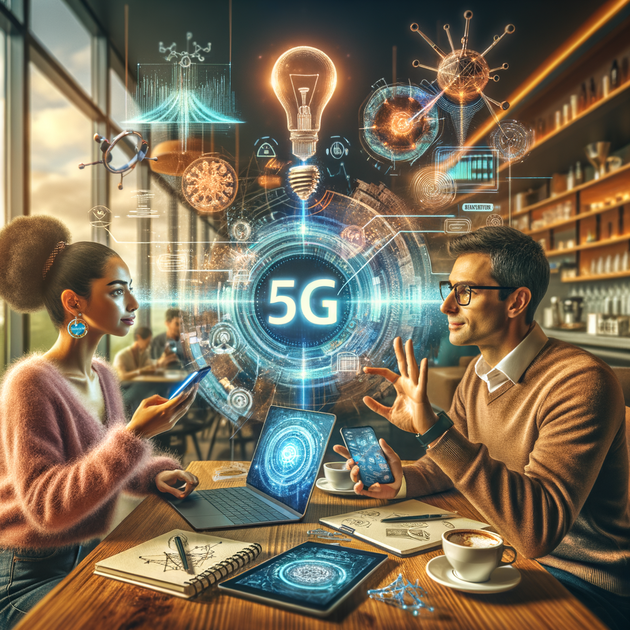Will 5G Truly Revolutionize AI? The Unvarnished Truth
Picture this: You’re sitting in a bustling café, sipping your coffee, and overhearing tech enthusiasts animatedly debating whether 5G will be the gamechanger for AI that many claim it to be. But is 5G truly the beacon of the future that will revolutionize artificial intelligence overnight? The short answer is no.
Understanding 5G’s Real Impact on AI
To quote a shopkeeper’s perspective on new roads: “It’ll be nice. It’ll be a little easier for my suppliers to bring goods and a little easier for my customers to reach me. But it won’t be something that can immediately be seen on my store’s profits.”
Analogy:
Think of 5G as upgrading from decent roads (4G) to slightly better roads. Yes, it’ll improve travel times and ease congestion, but it’s not a revolutionary leap.
This analogy extends perfectly to the AI industry. While 5G will indeed provide some benefits, such as increased data transfer speeds and lower latency, it will not single-handedly propel AI to unprecedented heights. Let’s dive deeper into why this is the case.
What Exactly Is 5G?
At its core, 5G technology revolves around using shorter wavelengths to transmit data more efficiently than 4G. However, shorter wavelengths come with their own set of challenges:
- Limited range: Shorter wavelengths can’t travel as far.
- Obstruction issues: They have trouble penetrating walls and buildings.
To overcome these hurdles, more 5G towers need to be installed closer together, driving up costs and complexity. This leads to the question:
Why Now for 5G?
Despite the challenges, we’re seeing the rollout of 5G for two main reasons:
- Engineering Marvel: Significant technological advancements have made it viable to deploy 5G despite its challenges. It’s akin to the impressive engineering feats required to construct a massive bridge.
- Market Demand: With the explosion in mobile network usage, the cost of deploying 5G infrastructure can be justified and shared among a vast user base.
These reasons highlight that while 5G is indeed an impressive achievement, its immediate impact on AI is more akin to an incremental improvement rather than a seismic shift.
5G in the Context of AI
To truly appreciate 5G’s role in AI, it’s important to consider the massive ecosystem that supports AI development. AI’s progress hinges on numerous factors:
- Data Availability: The lifeblood of AI; quality and quantity of data are paramount.
- Computing Power: Advanced GPUs and TPUs fuel AI’s computational needs.
- Algorithms: Innovations in AI algorithms drive the next waves of development.
- Infrastructure: Connectivity options like 4G and 5G form part of this puzzle.
Among these, 5G’s role is supportive but not transformative. Yes, faster and lower-latency networks will enable some real-time applications of AI more fluidly, such as autonomous vehicles and remote surgeries. But these advancements are just pieces of a much larger AI puzzle.
Practical Examples of 5G and AI Integration
Example: 5G and Self-Driving Cars
5G’s low latency can assist in the real-time communication required for autonomous vehicles, making them safer and more efficient on the roads. However, these vehicles also rely heavily on advanced sensors, robust algorithms, and comprehensive mapping databases.
Example: 5G in Healthcare
Consider remote surgeries. 5G can indeed provide the reliable, high-speed data transfer necessary for such delicate procedures. But it’s the precision of robotic systems and the expertise of surgeons that are the true gamechangers.
In both examples, 5G serves as an enabler rather than a primary driver. The critical leap in functionality comes from the integration of multiple technological advancements, not from 5G alone.
The Verdict: 5G—Nice but Not a Gamechanger for AI
As with the new roads analogy, 5G will make certain aspects of AI deployment smoother and more efficient, but it won’t revolutionize AI in isolation. AI’s ascendancy relies on a symphony of technological advancements, and 5G is just one of the many players in this orchestra.
So, the next time you hear 5G being touted as the next big thing for AI, you can appreciate its role – a helpful advancement, but no overnight gamechanger.
What do you think? Will 5G pave the way for new AI achievements, or is its impact more modest? Share your thoughts in the comments below. Let’s discuss!
